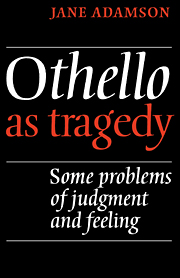
-
Select format
-
- Publisher:
- Cambridge University Press
- Publication date:
- 16 September 2009
- 30 October 1980
- ISBN:
- 9780511553066
- 9780521297608
- Dimensions:
- Weight & Pages:
- Dimensions:
- (216 x 138 mm)
- Weight & Pages:
- 0.415kg, 312 Pages
You may already have access via personal or institutional login
Book description
Critical views of Othello have polarized during the last forty years. The dispute is between those who follow Coleridge and Bradley and see Othello as noble but diabolically misled, and those who follow Eliot and Leavis and see him as a criminal egotist. Jane Adamson argues that both views are too simple and that both deprive the play of tragic point. She is concerned to reinstate the play as a great tragedy, and Othello as a complex tragic figure. She considers in detail how the drama unfolds; how Othello's predicament provides a focus for moral questions raised in all the other characters; how the reader or spectator becomes painfully involved with similar questions in trying to understand the action; and how in these ways the play continually undercuts easy moral simplifications. During this study a great deal else in Shakespeare is illuminated - especially his insight into the need for love, and the dangers that are inseparable from that need.
Contents
Metrics
Full text views
Full text views help Loading metrics...
Loading metrics...
* Views captured on Cambridge Core between #date#. This data will be updated every 24 hours.
Usage data cannot currently be displayed.
Accessibility standard: Unknown
Why this information is here
This section outlines the accessibility features of this content - including support for screen readers, full keyboard navigation and high-contrast display options. This may not be relevant for you.
Accessibility Information
Accessibility compliance for the PDF of this book is currently unknown and may be updated in the future.


